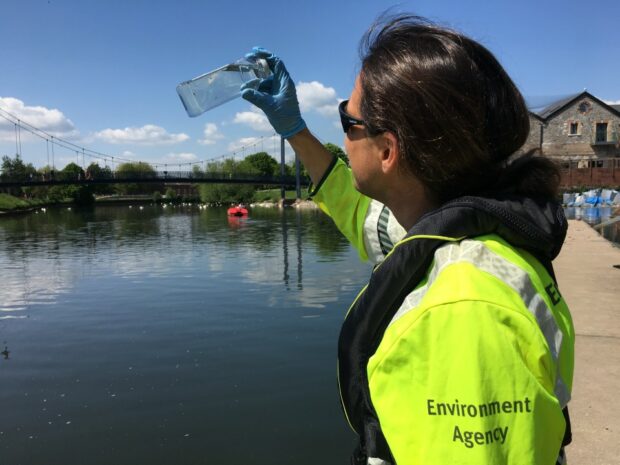
The water industry is underperforming, and it needs to change. We know that people want and deserve more for their water environment. We are meeting this challenge head on.
We want to be a modern, confident and efficient regulator. To enable this, a new model for regulation was developed with the launch of the Water Industry Regulation Transformation Programme (WIRTP) in 2023. It set out measures to transform the way we regulate the water industry to uncover more non-compliance and drive better performance from water companies.
What do we want to achieve?
With additional funding secured following our water quality charges consultation earlier this year, we are building on our plans by further increasing capacity and improving capability. We will continue to uncover non-compliance and drive better performance from the water industry.
Dedicated teams made up of new and experienced officers will focus on regulating the water industry. By March 2027 we will have 500 staff including environment officers, data analysts, enforcement specialists and technical experts as well as team leaders and managers to lead new regulation teams.
We are also increasing our inspection and audit work substantially to understand the true scale of non-compliance. Inspections will rise significantly and we will carry out 4,000 by the end of March 2025; 10,000 in 2025/26 and 11,500 in 2026/27.
This may mean we uncover more non-compliance, but this doesn’t mean impacts on the environment are going up, as we expect much of it to be ongoing historic issues. However, performance will initially look worse, but through increased enforcement activity we will work with the industry to improve compliance.
More boots on the ground are a significant element of our programme, but alone won’t achieve the step-change in performance we need to see. We are investing around £15 million on enhancing our digital systems and tools to help identify the cause of issues, not just the symptom. We are improving existing tools and developing new ones that will enable us to receive, store, analyse and validate data.
Data and information from lots of sources will be combined and we’ll have the ability to turn it rapidly into regulatory intelligence so that we can easily identify and tackle the highest priority issues.
Enforcement
Over the next three years we’re spending £15.8 million on improving water company enforcement. We will increase our enforcement action, responding swiftly when pollution and environmental harm has been found.
We will see greater use of enforcement powers, including prosecutions for the most serious offences. We are also working on the implementation of new enforcement options such as Variable Monetary Penalties (VMPs) to conclude action more effective and efficiently. We believe this will discourage future offending.
Drainage and Wastewater Management Plans
A specialist team will lead our new statutory duty to work with water companies to develop their Drainage and Wastewater Management Plans (DWMPs).
These are vital for setting out how the industry plans to extend, improve, and maintain a robust and resilient drainage and wastewater system in the face of pressures from climate change, urban development and a growing population
We will bring about a change in performance from the water industry that we all want to see.
We will regulate for a cleaner water environment, increasing scrutiny, identifying failures and providing the intelligence for enforcement and remedial action. This will discourage future offending, inform plans to improve water company compliance and develop more resilient infrastructure to cope with the double pressures of growth and climate change.
We will prioritise the greatest impact and risk first, but WIRTP is a long-term plan. Fundamental change takes time, and a stronger approach to water regulation will mean we are likely to uncover more issues, but ultimately, we will see a compliant and resilient water industry.

5 comments
Comment by Ian posted on
Look forward to it actually happening
Comment by Derek posted on
As part of a local voluntary water testing Environmental group ,we welcome any new measures that seek to improve on the results we see weekly.Electro- conductivity,Phosphate and,Nitrate levels are regularly showing very bad toxicity levels.The tide ,really does need to turn.
Comment by Mohaned Aboshatta posted on
I believe it’s crucial to enforce implementation of the telemetry in wastewater treatment systems used in construction and infrastructure. This would give you the advantage to review the compliance with the discharge criteria at ANY time during operation unlike sampling testing regimes.
Comment by David Bradshaw posted on
Water byelaws have changed over the years, no roof tanks in houses for toilets and hand basins, large shower heads, all outlets on direct mains.
Little wonder the UK has a water shortage.
Should Water Regulations be totally revised to take acciunt if rhese situations??
I have been in tge industry for over 60 years, as designer, insaller, contract manager, and have seen the deteriation in standards.
Comment by Getahun posted on
Water as a strategic commodity cross-cutting every other social and economic sector is taken for granted without the proper understanding of that. Too much has been taken for granted in this most vital sector, how a drop of water is managed, used efficiently disposed of effectively should be the concern of every citizen and the government alike. The policy, legal, and institutional framework of this sector needs a regular and much closer review and updating in light of developing issues.